|
As Fall descended on the Savoie,
I was slightly depressed to miss the turning of the leaves
in New England. Still, J was coming for a week in which
we would visit the Cinque Terre in Italy, so I tried to
make the best of the remaining weekends in the month by
making a couple of short trips.
|
|
|
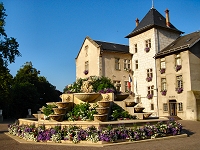
Aix-les-Bain's town hall.
|
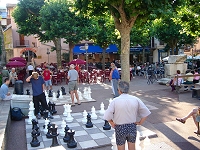
Chess in the afternoon.
|
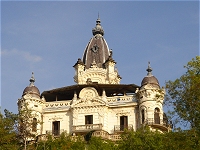
Le Roche du Roi.
|
|
|
After four months in the Savoie,
it was time to write a few words about the town in which
I was living. Aix-les-Bains is a lakeside resort town about
20 minutes north of Chambéry. Vacationers come not
only for the mountain air or the boating and swimming opportunities
but also for the thermal baths. Bains means baths
and Aix is derived from the Latin aquae, so
itís not to difficult to realize that the Romans discovered
this area and dipped their toes in the 100+ degree water
from time to time. There is an arch dowtown that was part
of a mausoleum because the Romans believed thermal baths
were entrances to the underworld. Now we just build casinos
near them. Today, there are three national baths in Aix
Ė Thermes Pellegrini, Thermes Chevalley, and Thermes Marlioz
Ė and French curistes come from all over the country
to use the healing waters. There is a poster with drawings
depicting the various treatments. Letís just say that no
orifice is safe. Iíve heard that you must have a prescription
from a French doctor to have the "full treatment".
Aix-les-Bains has a nice pedestrian
zone downtown strip and a beach and water park, but the
nicest part of town is down by the Grand Port. One can eat
in a number of the restaurants, browse around the boats
and yachts, walk out on the pier extending into the lake,
or stroll along the plane tree lined Boulevard du Lac towards
the Petit Port. Along the boulevard is a large park with
ice cream stands, pétanque areas, a skateboard
park, and childrenís rides. Itís a great way to spend a
sunny spring, summer or autumn day with the family.
Aixís heyday was during the Belle
Époque when it was one of the places to be during
the summer months. Queen Victoria was a regular visitor
as was other royalty. But Aix calls itself the city of writers
because, in addition to visits from Balzac, Alexandre Dumas,
and Guy de Maupassant (who went to the baths to cure his
syphilis), this lovely lakeside resort is where Alphonse
Lamartine fell in love with a married Parisian woman who
suffered from tuberculosis. They vowed to return the next
summer, but she didnít survive to make it, and Lamartine
mourned her in his classic poem Le Lac (The Lake).
Some consider Lamartine as the first French romantic poet.
|
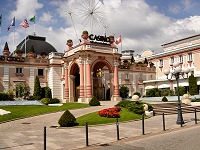
The Grand Cercle casino takes your
money regardless of nationality.
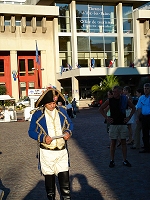
Celebrities abound.

Thermes Marlioz.
|
|
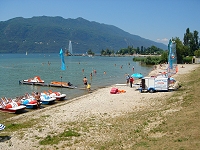
The beach.
|
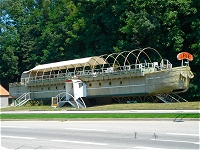
A local pub by the lakshore.
|
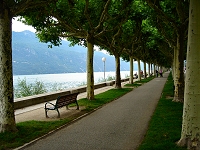
Boulevard du Lac.
|
|
|

Only two options - up or down.
|

The easy way down.
|

Just hanging out.
|
|
| Before J
came to visit, I owed it to her to finally conquer the mountain
that defeated us a short time before. Actually, it was the
one next to it. On a misty morning, I made my way out through
Albertville to the town of Bourg St. Maurice not far from
the Italian border. As I followed the same windy road up
the mountain I paid special attention to the signs and found
the turnoff that was marked as the way to Fort 2000 (for
2000 meters elevation). I parked by the side of the road
and began the long uphill walk that would finally take me
to what I had seen in the guidebook. The hike was longer
than I had anticipated because what I thought was the fort
was actually another fortification much older and much lower.
I had found Twofort mountain. Eventually after three hours
of climbing I caught my first magnificent glimpse of Fort
2000. The fort is technically called Fort de la Platte and
was built by the French shortly after Italian unification
to protect the valley from any possible invasion Italy had
planned.
I was pleased to see that the fort
was open (always a gamble in France) and furthermore it
was free. But as I walked inside and almost stepped on a
tricycle, I quickly learned why. A family of goat farmers
was living in the fort. The patriarch said something to
me in what must have been some mountain folk version of
French, and I spun a quick 180 out of there with unpleasant
images of a French Deliverance playing in my head.
I still had a taste for adventure when I espied a sign pointing
the way to Les Cinqs Lacs (Five Lakes). The idea of seeing
a crystal clear blue mountain lake, much less five of them,
appealed to me so made my way in that direction. Of course
the sign led to a trail that started climbing again, and
after another hour, I was beginning to doubt the authenticity
of the sign when I happened across an older couple who were
in the possession of a map. A map is a valuable thing in
this situation not because it tells you where you are going
but rather how much further you have to go. I noted that
the first few lakes were only another 15 minutes away, politely
declined the generous offerings of vin et saucisse,
and ambled on my merry way. Well the Five Lakes should be
renamed the Four Puddles and a Pond because that is what
I found.
Slightly dejected and feeling the
onset of blisters, I looked down at my watch in horror to
find that I had been walking for five hours. Even using
the hikerís formula of walking downhill being 20% faster
than walking uphill, I was still looking at a four hour
slog. People say that it is harder to walk downhill than
uphill, and I am now a believer. About two hours into the
return hike my knees were aching, my toes were crammed into
the front of my boots, my calves were having muscle spasms,
and the skin on the bottom of my feet was now attached to
my boots rather than my feet. I stopped several times to
inspect the damage in my now bloody socks, but taking breaks
didnít get me any closer to the end of the trail. I even
tried walking backwards and sideways to alleviate the pain.
Finally, after four and a half hours of walking downhill
and over 9 hours walking in total, I crawled to my car as
the sun was going down. I wept openly for several minutes
before leaving Ė beaten by the mountain again.
|
|

One of the Five "Lakes".
|

A winter chalet.
|

Fort de la Platte.
|
|
|
| On
the way out of Bourg St. Maurice, I couldnít help but stop
in the local cheese cooperative to buy some of the local
treats. The Savoie is after all cheese country, and it is
known mostly for tommes which have a distinct nutty
flavor (to my untrained palate anyway). The store at the
cooperative had a number of giant wheels, but I opted for
a slice of the special summer Beaufort because I had no
clue and "special" sounded like I was getting
something unique. I knew Beaufort was a cheese commonly
used it fondues, so I was fairly confident it would be edible.
It was indeed delicious. It cost me about Ä15, but then
again I munched on it for about two weeks.
|
|

The cheese making process begins.
|

The cooperative in Bourg St. Maurice.
|

The final product.
|
|
|
|
Columbus Day, one for the few holidays
that I get and my French colleagues donít, was coming up
and I ran through some options to occupy myself for the
long weekend. A quick look at the Champions League schedule,
and my decision was made for me. Bayern München was
going to be in Turin to play Juventus for the second leg
of their home and away series. Turin was only a two-hour
train ride away, and I had been mulling over the idea of
going to the Winter Olympics in February, so a quick trip
would also give me an opportunity to scope out the viability
of that plan. Although I had no ticket for the game, I bought
my train ticket and reviewed my notes on Juventus ticket
locations. Champions League games are highly sought after
matches as they pose the best teams against one another.
So my top priority was to find a hotel for the night. Second
on the list was to buy a ticket to the Bayern-Juve game.
Right behind that was finding a place to stay in Turin during
one of the Olympic weekends in February. I picked the middle
weekend as it gave me the best options for seeing an event,
but I would be flexible. Lastly, I would try to get tickets
to an Olympic event, my rationale being that it would be
harder to find accommodations than it would be to buy a
ticket. Plus, tickets are useless if you have nowhere to
sleep.
Everything seemed to be running smoothly.
I was on the right train. I had remembered my passport.
But just after the stop at the border in Modane, things
began to unravel. An announcement in garbled French followed
by garbled Italian was made over the intercom. Passengers
with puzzled looks began to discuss the meaning of the announcements.
What was known was that we were all getting off the train
at the next stop. What was being discussed was the reason
why. The Italians thought that there had been a fatality
as someone had been hit by an earlier train while walking
along the tracks. The French passengers were convinced that
it was a strike since thatís why all French trains stop
running. All I knew is that we had to get off the train
45 minutes from our destination. So as I sat in the train
station in Oulx and pitied the station master who was being
berated by angry mob of Italians, I learned that we were
all waiting for a bus. Two hours later, we were still waiting
for a bus, but I had a little more understanding of what
was going on. Apparently, protestors against the proposed
high-speed train linking Milan and Paris had blocked the
tracks, and the police were unable to get them to budge.
The train coming in the opposite direction had the same
predicament, so we were to be bussed to their train and
they would be transported to our train so we could both
be on our way. So we were all waiting for a bus, and thatís
what finally arrived Ė a single bus for about 250 people.
It was an all out free-for-all to get on that bus. Men were
shoving women out of the way. Women were shoving children.
Children were being shoved. The humanity of it all! No one
seemed to care that the train to which the bus was taking
us wasnít leaving until we were all on it. Eventually, we
all made it to the train and finally arrived in Turin. My
two-hour trip to Turin took six hours.
Arriving at my destination in the
evening threw my priorities into disarray. I now had to
find a ticket to the soccer game before all else. I went
to the closest ticket office, and they were already closed.
My second, third, and fourth were also closed. Finally after
circling the city on foot, I found a tabacchi that
was open asked the proprietor if he had still had a ticket
for the Bayern-Juve game. He looked curiously at the heaving,
sweaty foreigner who stood before him and nodded affirmatively.
I held my ticket proudly as I searched for a hotel near
the heart of the old city. I was in no mood for shopping
around for bargains, so I took the first decent thing that
came along Ė a nice hotel near Via Roma.
The following morning was spent scouring
the city for a hotel room during the Olympics. No one had
anything. In fact, most just chuckled when I asked. One
kind soul finally told me that pretty much all of the downtown
hotels had given their rooms to the Olympic Committee for
officials and dignitaries. I kept at it and finally found
a hotel ironically next to the one at which I was staying
that had a room. "No problem", said the
old man and he wrote my name down in his book in pencil.
I asked if he needed a credit card number or whether I should
pay in advance. "No, No. Itís in here",
he said tapping his book. I left the hotel as sure about
having a room as I did when I went in. Next up was Olympic
tickets. I hiked over to Piazza Solferino where I found
the ticket office closed. After all, it was only 10:30am.
I did a little sightseeing and came back at 11 to find the
office open but with a line of about 12 people. I also noticed
that they didnít take credit cards. I took a number and
hunted for an ATM. When I returned, they called my number
and I walked to the front of the line to the dismay of my
line-mates. Of course, the girl who waited on me didnít
speak any English (or French or German), so I did my best
to explain that I wanted tickets for the Olympics. She had
special forms for that, and we finally seemed to agree that
I had bought two tickets for a hockey game on 18 February.
I paid Ä40 per ticket along with a Ä30 service charge, and
she handed me a piece of paper. My tickets would be sent
to me in the mail.
So with no Olympic tickets and a
possible hotel room, I sat down to a late lunch of pizza
with pears and gorgonzola. A little more sightseeing and
it was time to use my coveted ticket for the Bayern-Juve
game. The Bavarians were already in rare form as they sang
along Via Garibaldi with beers in hand. I sorted out which
bus would take me to the Stadio delle Alpi and 45 minutes
later I was there. The parking lots were almost empty, but
then again I had arrived early because the security at Italian
games is notorious. Once inside, the stadium was still virtually
empty. Five minutes before kickoff and only 20% of the seats
were occupied. I asked the guy closest to me (about 12 seats
over) why no one was here for a game of this magnitude.
He told me that people donít come to the games but watch
them on TV instead. They donít like the stadium because
they are too far away from the field. It became clear to
me why the guy who sold me the ticket looked at me strangely
when I asked if he had any left. The game was good but it
was like watching a training session Ė no PA announcer,
no scoreboard, no clock, etc. Much to the delight of the
tens of fans, Juve won 2-1, and we all piled into buses
to go back to town.
The next morning I caught my train
back to France. The return ride was refreshingly uneventful,
but it was still a memorable trip.
|
|

Juve fans stock up on souvenirs.
|

The Stadio delle Alpi.
|

Tens of fans celebrate a Juve goal.
|
|
|

